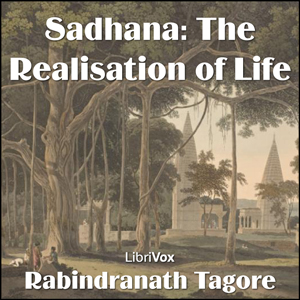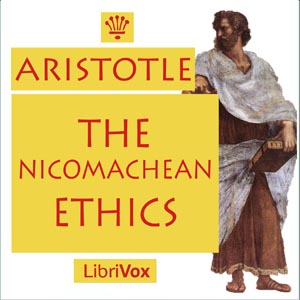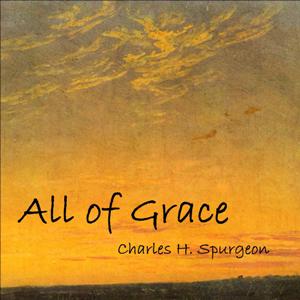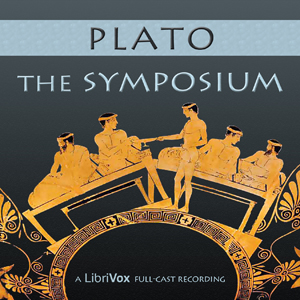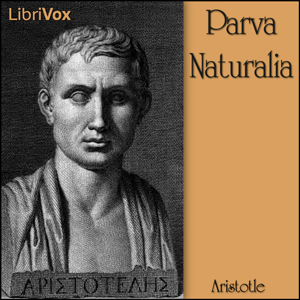A guide for Christians to walk a godly life. Covering various practical and spiritual topics.This project was proof listened by Guero and Laura Victoria.
32 episodes
A collection of essays on the Hindu/Buddhist view of humankind's place in the universe. As the author says in his introduction: "in these papers, it may be hoped, western readers will have an opportunity of coming into touch with the ancient spirit of India as revealed in our sacred texts and manifested in the life of to-day."Most of the essays were given as lectures before Harvard University in 1916 or before. (Summary by Peter Yearsley)
8 episodes
The classic of the Way and of High Virtue is the Tao Teh Ching. Its author is generally held as a contemporary of Confucius, Lao Tzu, or Laozi. The exact date of the book's origin is disputed. The book is divided into two parts, the Upper Part and the Lower Part. The Upper Part consists of chapters 1-37, and each chapter begins with the word "Tao," or the Way. The Lower Part consists of chapters 38-81, and each chapter begins with the words "Shang Teh," or High Virtue. This 1919 edition names the Lower Part as the Wu Wei, or translated variously as "not doing," "non-ado," or "non-assertion." This edition also contains a history of the book and its author, Lao Tzu, along with a discussion of the Wu Wei. Lao Tzu's classic has been cherished as suggestions, rather than commandments, for finding one's path to beauty, goodness, and quality of life through a non-assertive understanding of the Way. (Summary by Melanie McCalmont)
8 episodes
Veröffentlicht 1867. Eine stoische Anleitung zum Leben. Knapp und gut geschrieben.(Summary by redaer)
3 episodes
In der Abhandlung „Zum ewigen Frieden" wendet Kant die Grundsätze seiner Moralphilosophie auf die Beziehungen zwischen Staaten an. Er stellt klar, dass Frieden kein natürlicher Zustand sei und deshalb gestiftet werden müsse. Um das Ziel „Weltfrieden“ zu verwirklichen, müssten sich die Staaten einem allgemein verbindlichen Völkerrecht unterordnen. In seinen Bestimmungen und Erläuterungen nimmt Kant zahlreiche Entwicklungen hin zum modernen Völkerrecht vorweg.
In his essay "Perpetual Peace", Kant applies the principles of his moral philosophy to the relations between nations. He points out that peace is not a natural state and therefore must be instituted through human effort. To make "world peace" come true, all nations should submit to general and binding international laws. In his definitions and explanations, Kant anticipates many aspects of the development of modern international law.
(Summary by Al-Kadi)
5 episodes
Richtiges Leben und Regeln dazu. Wertvoll und hilfreich. (Summary by redaer)
10 episodes

Nach heutigen Erkenntnissen (linguistisch, Zitierbelege etc.) entstand das Daodejing um 400 v. Chr.Laozi (chin. 老子, Lǎozǐ, W.-G. Lao Tzu „‚Alter Meister‘“), ein legendärer chinesischer Philosoph, soll im 6. Jahrhundert v. Chr. gelebt haben. Je nach Umschrift wird der Name auch Laotse, Lao-Tse oder Lao-tzu geschrieben.Erstveröffentlichung der Übersetzung 1910.Das Daodejing (chin. 道德經, Dàodéjīng) (ältere Umschrift: Tao Te King) ist eine Sammlung von Spruchkapiteln, die dem legendären Weisen Lǎozǐ zugeschrieben wird. Die Entstehungsgeschichte ist ungewiss und Gegenstand sinologischer Forschung. Ungeachtet weiterer Übersetzungen bedeuten Dào „Weg, Prinzip“ und „Sinn“, und Dé „Kraft, Leben“ und „Charisma, Tugend, Güte“. Jīng bezeichnet einen Leitfaden bzw. eine klassische Textsammlung. Die beiden namengebenden Begriffe stehen für etwas Unaussprechliches, auf dessen eigentliche Bedeutung das Buch hindeuten möchte. Aus diesem Grund werden sie auch oft unübersetzt belassen. Das Werk gilt als die Gründungsschrift des Daoismus. Obwohl dieser verschiedene Strömungen umfasst, die sich vom Dàodéjīng erheblich unterscheiden können, wird es von den Anhängern aller daoistischen Schulen als kanonischer, heiliger Text angesehen. (Zusammenfassung von Wikipedia)
5 episodes
Lysander Spooner (1808 – 1887) was an American individualist anarchist, entrepreneur, political philosopher, abolitionist, supporter of the labour movement, and legal theorist of the nineteenth century. Here he gives his views on the role of Governments in the private lives of their citizens (Summary by Annise)
3 episodes
George Edward Moore, usually known as G. E. Moore, (1873 – 1958) was a distinguished and influential English philosopher. He was, with Bertrand Russell, Ludwig Wittgenstein, and (before them) Gottlob Frege, one of the founders of the analytic tradition in philosophy.
21 episodes
The work consists of ten books, originally separate scrolls, and is understood to be based on notes said to be from his lectures at the Lyceum which were either edited by or dedicated to Aristotle's son, Nicomachus. In many ways this work parallels the similar Eudemian Ethics, which has only eight books, and the two works can be fruitfully compared. Books V, VI, and VII of the Nicomachean Ethics are identical to Books IV, V, and VI of the Eudemian Ethics. Opinions about the relationship between the two works, for example which was written first, and which originally contained the three common books, is divided. Aristotle describes his ethical work as being different from his other kinds of study, because it is not just for the sake of contemplating what things are, but rather to actually become good ourselves. It is therefore practical rather than theoretical in the original Aristotelian senses of these terms. (Summary from Wikipedia)
10 episodes

Dole briefly sketches the history of life, and shows how it has a definite direction - toward the survival of the kind and gentle people. It's a challenging, and quite persuasive argument, and also a much needed one in light of the dog-eat-dog theories out there. Dole shows that in our evolving society, our traditional understanding of "survival of the fittest" needs to be updated. A book that was way ahead of its time, yet so suited to it. Some may argue that - since he was writing The Coming People before the first two world wars - that he was obviously wrong. However, his argument remains valid given current scientific evidence cited in such books as "Evolution and Empathy", and "The Age of Empathy", and it's noteworthy that he wrote another book after World War I (see, A Religion for the New Day, 1920, where he states that while society is still quite barbaric, he retains his powerful conviction that it "is improving and improvable". ). Also, Dole points to the many flaws of his time (and ours too), and stresses the need to fix them in a peaceful, intelligent manner. Many of the issues he grappled with remain just as strong today, and he stated that it might be such. "The Coming People" is a universal, important message, and will continue to find home in the hearts of agnostics, believers, and atheists (at least for its strong social argument). (Introduction by Max Cusimano)
13 episodes
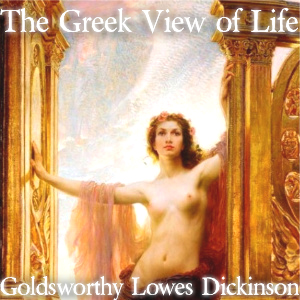
“With the Greek civilisation beauty perished from the world. Never again has it been possible for man to believe that harmony is in fact the truth of all existence.”
This elegantly-written work provides a splendid introduction to the Greeks of the classic period: how they thought, wrote, and organised their lives and loves. Although it dates from the 1890s, there is very little about it that has dated. To its author’s credit, the subject of “Greek love” is dealt with in a sane and factual context - despite the judicial assassination of Oscar Wilde going on in the background.
A Cambridge don much admired by his students (including E. M. Forster), Goldsworthy Lowes Dickinson belonged to the Apostles, a secret society with a strong ethic of male friendship. Alfred Tennyson and his beloved Arthur Hallam were early members. Dickinson is chiefly remembered as a historian and pacifist who played a significant part in the founding of the League of Nations. Inevitably, given his interests and intellectual background, he became a close associate of the Bloomsbury Group.
The Greek View of Life is no dry academic tome. It is a popularizing work in the best sense: accessibly written and illustrated with apt quotations given in sturdy translations, never in the original Greek. It is a joy to read.
(Introduction by Martin Geeson)
52 episodes

These articles, pamphlets, and stories relating to the Girls Scouts of America touch on the history, activities, ideals, and traditions of this remarkable girls' organization. Though some of the articles appear redundant, they were selected to represent a contemporary view spanning five years of the organization's early popularity (1917-1921). Of significance are the detailed descriptions of Girl Scout involvement in war work during what is now known as World War I. Girl Scouts were prepared through their training for merit badges to be independent, resourceful, reliable, and helpful. They were able to make their own clothes, grow and cook their own food, care for the sick, and start a small business--skills that prepared young women for their future roles as homemakers, workers, and citizens.A version of the story "The Brownies" is still part of the Brownie Girl Scout literature into the 21st century. The Encyclopaedia and Dictionary of Education edited by Foster Watson (1921) provides the following explanation under the entry for "Girl Guides": "The 'Brownies' are children under 11, who take two promises only, and whose motto is 'Lend a hand.' The scheme is based on Mrs. Ewing's story of the 'Brownies.'"Though not an official Girl Scout story, The Tadger Tales have become a tradition with many Girl Scout summer camp programs. The stories are read aloud and acted out with improvisation and much silliness. The event concludes with a secret Tadger club ritual involving a safety pin, some tape, and a bit of string.
12 episodes
Colonel William Crosbie Hunter was a businessman and self-help writer who was moderately popular in the early 20th century. His books set forth his personal philosophy on health, happiness, human relations, and success in the business world. Pep, billed as "A book of how's not why's for physical and mental efficiency," was published in 1914 and went through several editions. (Introduction by Pleonic)
12 episodes
In this book, Schweitzer traces the historical progress of 'Historical Jesus' research, from Hermann Reimarus in the mid 18th century, to William Wrede at the turn of the 20th. Schweitzer showed how Jesus' image had changed with the times and with the personal proclivities of the various authors. He concluded with his own synopsis and interpretation of what had been learned over the course of the previous century. He took the position that the life of Jesus must be interpreted in the light of Jesus' own convictions, which he characterized as those of late Jewish eschatology. (Introduction from Wikipedia, modified by JoeD)This project was proof listened by Tim Ferreira, Goergedave, Betty M., Phil Chenevert, and Guero.
46 episodes
Essentially the sequel to The Life of St. Teresa, Teresa recounts the foundations of the Discalced Carmelite monasteries in Spain, both for men and women. This book tells of all the triumphs and troubles, and about the many people who helped her.(Introduction by Ann Boulais)
31 episodes
HE WHO SPOKE and wrote this message will be greatly disappointed if it does not lead many to the Lord Jesus. It is sent forth in childlike dependence upon the power of God the Holy Ghost, to use it in the conversion of millions, if so He pleases. No doubt many poor men and women will take up this little volume, and the Lord will visit them with grace. To answer this end, the very plainest language has been chosen, and many homely expressions have been used. But if those of wealth and rank should glance at this book, the Holy Ghost can impress them also; since that which can be understood by the unlettered is none the less attractive to the instructed. Oh that some might read it who will become great winners of souls!
Who knows how many will find their way to peace by what they read here? A more important question to you, dear reader, is this – Will you be one of them? (From All of Grace)
11 episodes
Epistulae morales ad Lucilium sind eine Sammlung von 124 Briefen. In den Briefen erteilt Seneca Ratschläge, wie Lucilius, von dem lange Zeit vermutet wurde, er wäre eine fiktive Gestalt, zu einem besseren Stoiker werden könnte. Sicher ist, dass Seneca die Briefe als Mittel benutzte, um verschiedene Aspekte seiner Philosophie darzustellen. Zugleich eröffnen die Texte auch einen Einblick in das Alltagsleben des antiken Rom.
(Zusammenfassung von Wikipedia) Die Briefe 1 - 93 übersetzte August Pauly, die Briefe 94 -124 Adolf Haakh. Briefe 66 - 79: Text (1) & (5) Briefe 80 - 93: Text (2) & (5) Briefe 94 - 107: Text (3) & (5) Briefe 108 - 124: Text (4) & (5)Briefe (Epistulae morales ad Lucilium) 1 (1-65)
59 episodes
Thoughts are Things, authored by Prentice Mulford, is one of the earliest books espousing New Thought teaching. This book contains information on how to better man's spiritual and physical life through the power of thought. Discover timeless spiritual wisdom that, when practiced, will enrich your life and deepen your understanding of Universal Truth (Summary by Andrea Fiore)
13 episodes
Xenophon möchte zeigen, dass Sokrates ganz bewusst in den Tod gegangen sei. Das Unglück seines Todes war kein Zufall. Denn der Philosoph habe gespürt, dass seine Zeit gekommen sei, um das Leben zu vollenden und zu sterben. (Zusammenfassung von Wikipedia)
1 episodes
Surely the most deeply-rooted need of the human soul, its purest aspiration, is for the closest possible union with God. As one turns over the pages of this little work, written by Blessed Albert the Great towards the end of his life, when that great soul had ripened and matured, one feels that here indeed is the ideal of one's hopes. (From the Preface)
17 episodes

The Faith of Our Fathers: A Plain Exposition and Vindication of the Church Founded by Our Lord Jesus Christ is a book published in 1876 by archbishop James Gibbons, which became a best-selling conversion manual in the United States, and by 1980 was in its 111th printing. (From the preface) “The object of this little volume is to present in a plain and practical form an exposition and vindication of the principal tenets of the Catholic Church. It was thought sufficient to devote but a brief space to such Catholic doctrines and practices as are happily admitted by Protestants, while those that are controverted by them are more elaborately elucidated......As his chief aim has been to bring home the truths of the Catholic faith to our separated brethren, who generally accept the Scripture as the only source of authority in religious matters, he has endeavored to fortify his statements by abundant reference to the sacred text. He has thought proper, however, to add frequent quotations from the early Fathers, whose testimony, at least as witnesses of the faith of their times, must be accepted even by those who call in question their personal authority.” (Summary from Wikipedia with quotes from the preface of this volume.)
34 episodes
As Russia goes to war against Japan, Tolstoy urges those at all levels of society, from the Tsar down to the common soldier, to consider their actions in the light of Christ's teaching. "However strange this may appear, the most effective and certain deliverance of men from all the calamities which they inflict upon themselves and from the most dreadful of all—war—is attainable, not by any external general measures, but merely by that simple appeal to the consciousness of each separate man which, nineteen hundred years ago, was proposed by Jesus—that every man bethink himself, and ask himself, who is he, why he lives, and what he should and should not do." (Introduction by David Barnes, and extract from Chapter VI)
12 episodes

On the Soul (Greek Περὶ Ψυχῆς (Perì Psūchês), Latin De Anima) is a major treatise by Aristotle on the nature of living things. His discussion centres on the kinds of souls possessed by different kinds of living things, distinguished by their different operations. Thus plants have the capacity for nourishment and reproduction, the minimum that must be possessed by any kind of living organism. Lower animals have, in addition, the powers of sense-perception and self-motion (action). Humans have all these as well as intellect. The notion of soul used by Aristotle is only distantly related to the usual modern conception. He holds that the soul is the form, or essence of any living thing; that it is not a distinct substance from the body that it is in; that it is the possession of soul (of a specific kind) that makes an organism an organism at all, and thus that the notion of a body without a soul, or of a soul in the wrong kind of body, is simply unintelligible. (He argues that some parts of the soul—the intellect—can exist without the body, but most cannot.) It is difficult to reconcile these points with the popular picture of a soul as a sort of spiritual substance "inhabiting" a body. (Adapted from Wikipedia)
8 episodes
Maritime and metaphysical verse by John Masefield, English poet and author, Poet Laureate of the United Kingdom from 1930 until his death. (Summary by Liam Neely)
14 episodes
Wells considered this book one of his most important, a natural follow-up to such works as his Man of the Year Million and The Time Machine. His goal was to get people to think and act in new ways. The book starts with a look at how humans get along socially and how they carry out their business ventures. It then discusses how these elements influence others, such as politics, the world of work, and education. H. G. tried to make clear how the current social order was disintegrating without preparing another to take its place. He then traced the roots of democracy, which in its present state he saw as unworkable. Instead, he proposed a new republic. He also critiqued modern warfare. (Summary by Bill Boerst)
18 episodes

The Chymical Wedding of Christian Rosenkreutz was edited in 1616 in Strasbourg (annexed by France in 1681). It is the third of the original manifestos of the mysterious "Fraternity of the Rose Cross" (Rosicrucians).NOTE: It was translated into English for the first time in 1690 by E. Foxcroft. This translation became the source for many of the modern attempts to improve the original. The translation presented here is that of E. Foxcroft.Although the book first appeared in 1616, the story takes place over 150 years earlier. It is an allegoric romance (story) divided into Seven Days, or Seven Journeys, like Genesis, and tells us about the way Christian Rosenkreuz was invited to go to a wonderful castle full of miracles, in order to assist the Chymical Wedding of the king and the queen, that is, the husband and the bride. The story begins on an evening near Easter. In the final chapter—the seventh day—CRC is knighted; the year is 1459. It was on Easter-day 1459 that the Constitutions of the Freemasons of Strasburg was first signed in Regensburg, with a second signed shortly afterwards in Strasburg. The Gutenberg Bible began printing in Mainz, Germany in 1455, and the first Bible in German, the Mentel Bible, was printed in Strasburg in 1466. The invitation to the royal wedding includes the Monas Hieroglyphica associated with John Dee. (Summary by Wikipedia.org)
4 episodes
Faith and reason, love and virtue, morality and mortality! In these two short volumes the famous novelist, essayist, and playwright, Upton Sinclair, confided his most prized worldly wisdom for generations to come. His kind and witty personal advice both provokes and enlightens page by page. (Summary by Rom Maczka)
36 episodes
ivil Disobedience (Resistance to Civil Government) is an essay by American transcendentalist Henry David Thoreau that was first published in 1849. In it, Thoreau argues that individuals should not permit governments to overrule or atrophy their consciences, and that they have a duty to avoid allowing such acquiescence to enable the government to make them the agents of injustice. Thoreau was motivated in part by his disgust with slavery and the Mexican–American War. (Summary by Wikipedia)
2 episodes
This is an essay on decision biases and a critique on prejudices, neatly written and thought provoking. (Summary by sidhu177)
3 episodes
After a number of deaths in his close family, Sir Arthur Conan Doyle turned to spiritualism in hope of finding proof of the afterlife. Being open in this way, he wanted to believe that spirits and other supernatural being including fairies were real. Because of this he believed the photographs of fairies taken by the Cottingley girls were proof of the existence of such beings. In this book he presents his stance on the issue. Eventually it was proven that the photographs were indeed a hoax. (Summary by Amy Gramour)
12 episodes
Bennett's essays always provide food for thought and bring a wry smile to the lips. Human nature, it appears, changes little over the ages, and Bennett, as always, stands the test of time, though in the case of some of the essays in this eclectic collection, it is well to remember that they were written at the time of the First World War and the fight for women's suffrage. (Summary by Ruth Golding)
6 episodes
Bennett asks us to consider our brains as the most wonderful machine, a machine which is the only thing in this world that we can control. As he writes: "I am simply bent on calling your attention to a fact which has perhaps wholly or partially escaped you -- namely, that you are the most fascinating bit of machinery that ever was."As ever, his prose is honeyed, his thoughts inspired, and his advice as relevant today as when it was written.
16 episodes
Yoga sutras by Patanjali is a seminal work in yoga, this book is more about control of mind and the true goal of yoga. The sutras are extremely brief, and the translation in neat English makes it very easy for people to understand the ancient Sanskrit text. It starts with the birth and growth of spiritual man through the control of mind. In all, this is a "all in one" book for yoga philosophy written by the master himself. (Summary by sidhu177)
10 episodes
The Analects, or Lunyu, also known as the Analects of Confucius, are considered a record of the words and acts of the central Chinese thinker and philosopher Confucius and his disciples, as well as the discussions they held. Written during the Spring and Autumn Period through the Warring States Period (ca. 475 BC - 221 BC), the Analects is the representative work of Confucianism and continues to have a substantial influence on Chinese and East Asian thought and values today. William Jennings was a rector of Grasmere, and late colonial chaplain. He served at St. John's Cathedral in Hong Kong. (Summary by Wikipedia and Jing Li)
21 episodes
Essays: First Series is a series of 12 essays written by Ralph Waldo Emerson concerning transcendentalism, including Self-Reliance. It was published in 1841. (Summary by Wikipedia)
12 episodes
The Riddle of the Universe is the philosophical work of Ernst Haeckel, eminent biologist, in which he explores the meaning of life, the nature of reality, and the connection between physiology and thought. (Summary by A. Gramour)
29 episodes
In 1906, Eben Francis Thompson,scholar and poet, published a limited edition of his translation of the Quatrains of Omar Khayyam. This edition contains 878 quatrains, and represents the most extensive translation of Omar's rubai in any language.In the Introduction, Nathan Haskell Dole writes: Mr Thompson has put into English verse this whole body of Persian poetry. It is a marvel of close translation, accurate and satisfactory. He has succeeded in doing exactly what he set out to do - to add nothing and to take nothing away, but to put into the typical quatrain, as determined by Fitzgerald and others, exactly what Omar and his unknown imitators said. (Summary by Algy Pug)This project was proof listened by Algy Pug and Bev J. Stevens.
10 episodes
Vairagya Shatakam is one of the best books that gives the true picture of Renunciation. The book talks on how a common man gets lured by the endless desires which when satisfied fetches him nothing but the desires again. It concludes saying how these unsatiable desires mislead the man from knowing his real nature-omnipotence, omnipresence and omniscience! (Summary by Uday Sagar)
11 episodes

John Woolman was born at Northampton, N. J., in 1720, and died at York, England, in 1772. He was the child of Quaker parents, and from his youth was a zealous member of the Society of Friends. His “Journal,” published in 1774, describes his way of life and the spirit in which he did his work; but his humility prevents him from making clear the importance of the part he played in the movement against slaveholding among the Quakers. In 1742, Woolman, then a young clerk in the employment of a storekeeper in New Jersey, was asked to make out a bill of sale for a negro woman; and the scruples which then occurred to him were the beginning of a life-long activity against the traffic. Shortly afterward he began his laborious foot-journeys, pleading everywhere with his co-religionists, and inspiring others to take up the crusade. The result of the agitation was that the various Yearly Meetings one by one decided that emancipation was a religious duty; and within twenty years after Woolman’s death the practise of slavery had ceased in the Society of Friends. His own words in this “Journal,” of an extraordinary simplicity and charm, are the best expression of his personality. (Summary by The Harvard Classics)
14 episodes

Written by the Dutch philosopher Baruch Spinoza, the Tractatus Theologico-Politicus or Theologico-Political Treatise was one of the most controversial texts of the early modern period. It was a preemptive defense of Spinoza's later work, Ethics, published posthumously in 1677, for which he anticipated harsh criticism. In the treatise, Spinoza put forth his most systematic critique of Judaism, and all organized religion in general. Spinoza argued that theology and philosophy must be kept separate, particularly in the reading of scripture. Whereas the goal of theology is obedience, philosophy aims at understanding rational truth. Scripture does not teach philosophy and thus cannot be made to conform with it, otherwise the meaning of scripture will be distorted. Conversely, if reason is made subservient to scripture, then, Spinoza argues, "the prejudices of a common people of long ago... will gain a hold on his understanding and darken it." He reinterpreted the belief that there were such things as prophecy, miracles, or supernatural occurrences. He argued that God acts solely by the laws of "his own nature". He rejected the view that God had a particular end game or purpose to advance in the course of events; to Spinoza, those who believed so were only creating a delusion for themselves out of fear. (Summary from Wikipedia)
23 episodes
David Hume, an eminent Scottish philosopher, historian, and essayist, explores the nature and foundation of Morals in this book, which was written as a popular summary of Book III in A Treatise of Human Nature. Hume states: “There has been a controversy started of late, much better worth examination, concerning the general foundation of Morals; whether they be derived from Reason, or from Sentiment; whether we attain the knowledge of them by a chain of argument and induction, or by an immediate feeling and finer internal sense; whether, like all sound judgement of truth and falsehood, they should be the same to every rational intelligent being; or whether, like the perception of beauty and deformity, they be founded entirely on the particular fabric and constitution of the human species.” (Excerpted from Section I – Of the General Principles of Morals) (Summary from the text and adapted from Wikipedia by lubee930)
18 episodes
John Churton Collins was a literary critic who lived from 1848-1908. In 1904 John Collins became professor of English literature at Birmingham University (United Kingdom). He writes about the lives of English and German authors beginning with William Shakespeare (1564-1616) and ending with Alfred, Lord Tennyson(1809-1892). He wrote the book in response to On Heroes, Hero-Worship, and the Heroic in History, by Thomas Carlyle (1840). His son, L.C. Collins, collected these essays from various sources after his father's death. (Summary by Craig Campbell)
Additional proof-listening by Larry Wilson.
20 episodes
John Locke's essays on human understanding answers the question “What gives rise to ideas in our minds?”. In the first book Locke refutes the notion of innate ideas and argues against a number of propositions that rationalists offer as universally accepted truth. In the second book Locke elaborates the role played by sensation, reflection, perception and retention in giving rise to simple ideas. Then he elaborates on how different modes, substances and relations of simple ideas (of the same kind) give rise to complex ideas v.g. space, time, infinity etc. Finally he discusses complex ideas of mixed modes which arise from a combination of simple ideas of different kinds v.g. identity and diversity, cause and effect, etc. (Summary by bala) Prooflistening for this project was done by bala and Rapunzelina
41 episodes
In one of Plato's more accessible works, Apollodorus tells a friend about a drinking party (or symposium) attended by many of intellectuals of late 5th century Athens. The men are one their second night of celebration for Agathon's victory at the city Dionysia, and decide that instead of drinking, they should give speeches in praise of love. - Summary by Libby GohnRecorded as a dramatic work, cast list:
Apollodorus: KHandGlaucon: Elizabeth KlettCompanion to Apollodorus, and Pausanias: Beth ThomasAristodemus: ToddHWSocrates: alanmapstoneAgathon: Peter TuckerServant: staticstasyAristophanes: Libby GohnEryximachus: balaPhaedrus: Eden Rea-HedrickDiotima: Anna SimonAlcibiades: Chuck Williamson
Edited by Libby Gohn
4 episodes
Even before the Great War turned the world upside down, Western civilization was being revolutionized at all levels: intellectually, philosophically, artistically. Noted positivist philosopher George Santayana published this volume on the eve of the War, trying to portray the status of philosophy and theology at that moment by analyzing six significant topics: 1. the intellectual "temper" of the age 2. the clash between Modernism and Christianity 3. the new idealism of Henri Bergson 4. the new skepticism of Bertrand Russell 5. Shelley's fusion of philosophy and poetry 6. the so-called "genteel" tradition in American philosophy. - Summary by Expatriate
14 episodes
This collection of articles in early 20th Century American philosophy focuses on the topics of realism, experience, and ideas, with particular attention to the pragmatic naturalism of John Dewey.
In tracks 1-5, Dewey responds to critics of his famous article “The Postulate of Immediate Empiricism” (available in Short Nonfiction Collection Vol.034).
Tracks 6-12 constitute a series of pointed debates between Dewey and E. B. McGilvary on the topics of time, ideas, and reality.
Tracks 13-16 include stand-alone articles on related topics, including Dewey’s influential critique of “The Reflex Arc Concept in Psychology.”
Authors include: John Dewey, B. H. Bode, Frederick J. E. Woodbridge, J. A. Leighton, Evander Bradley McGilvary, John E. Boodin, and Sterling P. Lamprecht.
16 episodes
George Bernard Shaw, a playwright with a few bones to pick of his own, undertakes a surgical analysis of the social philosophies underlying the work of Henrik Ibsen. Focusing his analysis on Ibsen's challenge to the conventional "ideals" which both Ibsen and Shaw consider the greatest evils in human society, Shaw summarizes and exposits sixteen of Ibsen's plays, seizing the opportunity to elucidate some of the principles dearest to himself. Some of the most striking passages reveal Shaw's radical feminist perspectives, some of which resonate as if a half-century ahead of their time. A fascinating revelation of the minds of two great and revolutionary writers (it's not always obvious whose voice is exactly whose), this always-timely book exposes hypocrisies still poisoning Society in the twenty-first century. - Summary by Expatriate
19 episodes
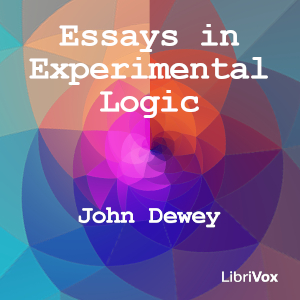
In this early collection of formative essays, acclaimed American philosopher John Dewey argues that the idealistic, realistic, and analytic schools of philosophy fail to take into account the pragmatic and experimental nature of experience - common to science and practical experience, but alien to the abstract theorizing of coherentist and correspondence theories of logic.
Here we find the essential groundwork for the mature naturalistic and process-oriented metaphysics that Dewey would elaborate in his later mature works such as Experience and Nature and Logic: The Theory of Inquiry.
In his long introduction, Dewey provides a summary and precis of his experimental logic, taking specifically pains to contrast his approach with the emerging analytic logic of Russell and Frege.
Chapters 3-6 take aim at the idealistic logic dominant in his time by providing a close reading and critique of the German logician Hermann Lotze.
Chapters 7-8 argue for the distinction between acquaintance with an external reality and knowledge of that reality.
Rather than disembodied and abstract, Dewey describes a logic arising out of the concrete interactions of organisms embedded within a natural environment. Dewey's logic of experience is essential to an understanding of his various projects, from education, to art, politics, pragmatism, and science.
(Summary by P. J. Taylor)
21 episodes

